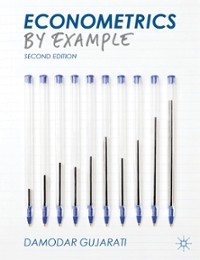Question
I - Decision Under Uncertainty [50 points] An investor is considering five possible investment strategies. The investor cares only about the expected payoff and possibly
I - Decision Under Uncertainty [50 points]
An investor is considering five possible investment strategies. The investor cares only about the expected payoff and possibly the variance of each strategy. The following table shows the payoffs under bad luck and good luck and the associated probabilities.
Strategy | Bad Luck Payoff | Probability of Bad Luck | Good Luck Payoff | Probability of Good Luck |
| A | 4 | 0.6 | 9 | 0.4 |
| B | 5 | 0.3 | 5 | 0.7 |
| C | 2 | 0.5 | 12 | 0.5 |
| D | 4 | 0.8 | 11 | 0.2 |
| E | 3 | 0.7 | 10 | 0.3 |
- Using a spreadsheet, determine the expected value and variance for each strategy. [20 points]
- Which strategy would be chosen by a risk-neutral investor? A risk-preferring investor? [20 points]
- Can we rule out any strategies if we know only that the investor is risk-averse? [10 points]
II - Reducing Risk [30 points]
Consider a household with $160,000 worth of valuables, such as jewelry. This household faces a 0.2 probability of burglary, which means it loses $70,000 worth of valuables. Suppose it can buy an insurance policy for $15,000 that would fully reimburse the amount of loss from burglary. The household's utility is given by U(X) = 4X0.5.
- Should the household buy this insurance policy? [10 points]
- What is the actuarially fair price for the insurance policy? [10 points]
- What is the most the household is willing to pay for this insurance policy that fully covers it against the loss? [10 points]
III- Investing Under Uncertainty [20 points]
Andy and Kim live together. Andy may invest $10,000 (possibly by taking on an extra job to earn the additional money) in Kim's MBA education this year. This investment will raise the current value of Kim's earnings by $24,000. If they stay together, they will share the benefit from the additional earnings. However, the probability is 50% that they will split up in the future. If they were married and then split, Andy would get half of Kim's additional earnings. If they were living together without any legal ties and they split, then Andy would get nothing. Suppose that Andy is risk neutral.
Will Andy invest in Kim's education? Does your answer depend on the couple's legal status?
Step by Step Solution
There are 3 Steps involved in it
Step: 1

Get Instant Access to Expert-Tailored Solutions
See step-by-step solutions with expert insights and AI powered tools for academic success
Step: 2

Step: 3

Ace Your Homework with AI
Get the answers you need in no time with our AI-driven, step-by-step assistance
Get Started


